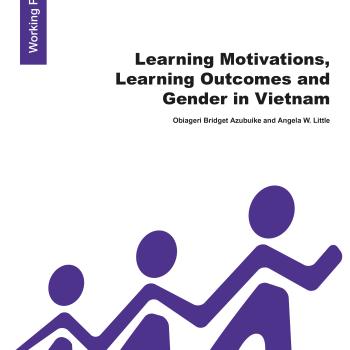
This working paper uses the 2016-17 Young Lives school survey data in Vietnam to examine learning outcomes and learning motivations for boys and girls in Grade 10. It examines how differences in learning motivations impact on learning outcomes and future expectations, and also examines the determinants of these differences and their relationships with student’s background and prior learning attainment.
The findings reveal that girls are approaching their studies with more discipline and diligence than boys on average. In general, girls demonstrate more of the favourable traits and attitudes to learning. The findings also indicate that, on average, girls are doing better in both maths and English and making better progress. However, their superior performance in mathematics isn’t robust enough to remain in their favour in more sophisticated analysis. Even though girls are on average doing better in maths, their beliefs about their maths abilities are low. Boys tend to have higher confidence in their maths abilities. The paper highlights four areas requiring attention in research and policy discussions on gender equity in Vietnam: how to raise girls’ self-concepts in maths; how to increase interest-oriented learning and reduce assessment-oriented learning; how to raise boys’ motivations for learning in general; and, through them, how to increase boys’ performance in English language and problem-solving.

This working paper uses the 2016-17 Young Lives school survey data in Vietnam to examine learning outcomes and learning motivations for boys and girls in Grade 10. It examines how differences in learning motivations impact on learning outcomes and future expectations, and also examines the determinants of these differences and their relationships with student’s background and prior learning attainment.
The findings reveal that girls are approaching their studies with more discipline and diligence than boys on average. In general, girls demonstrate more of the favourable traits and attitudes to learning. The findings also indicate that, on average, girls are doing better in both maths and English and making better progress. However, their superior performance in mathematics isn’t robust enough to remain in their favour in more sophisticated analysis. Even though girls are on average doing better in maths, their beliefs about their maths abilities are low. Boys tend to have higher confidence in their maths abilities. The paper highlights four areas requiring attention in research and policy discussions on gender equity in Vietnam: how to raise girls’ self-concepts in maths; how to increase interest-oriented learning and reduce assessment-oriented learning; how to raise boys’ motivations for learning in general; and, through them, how to increase boys’ performance in English language and problem-solving.

